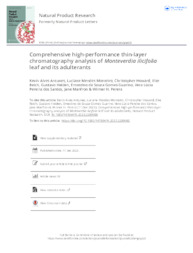Comprehensive high-performance thin-layer chromatography analysis of Monteverdia ilicifolia leaf and its adulter ants.
Comprehensive high-performance thin-layer chromatography analysis of Monteverdia ilicifolia leaf and its adulter ants.
Author(s): ANTUNES, K. A.; MONTEIRO, L. M.; HOWARD, C.; REICH, E.; HEIDEN, G.; GUARINO, E. de S. G.; SANTOS, V. L. P. DOS; MANFRON, J.; PERERA, W. H.
Summary: The leaves of Monteverdia ilicifolia (syn. Maytenus ilicifolia) are widely used in traditional South American medicine to treat gastrointestinal problems such as gastritis and ulcers. Several herbal products containing the leaves of M. ilicifolia can be found in the market. However, other species with similar leaf morphology are confounding materials, e.g. Monteverdia aquifolia (Celastraceae), Citronella gongonha (Cardiopteridaceae), Jodina rhombifolia (Santalaceae), Sorocea bonplandii (Moraceae) and Zollernia ilicifolia (Fabaceae). This study aimed to identify M. ilicifolia and distinguish it from its potential adulterants using high-performance thin-layer chromatography (HPTLC) technique. Comprehensive HPTLC analysis revealed specific fingerprints that can be used to assess the minimum content of epicatechin and the quality of commercial espinheira-santa samples. The results of the study demonstrated that the HPTLC method is capable of detecting adulterations and distinguishing M. ilicifolia from all confounding materials in commercial products available on the market, showing that most of the products are of poor quality due to adulterations.
Publication year: 2023
Types of publication: Journal article
Keywords: Cromatografia, Monteverdia ilicifolia
Observation
Some of Embrapa's publications are published as ePub files. To read them, use or download one of the following free software options to your computer or mobile device. Android: Google Play Books; IOS: iBooks; Windows and Linux: Calibre.
Access other publications
Access the Agricultural Research Database (BDPA) to consult Embrapa's full library collection and records.
Visit Embrapa Bookstore to purchase books and other publications sold by Embrapa.

